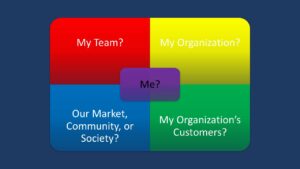
TL;DR: https://youtu.be/h5UJaGQJkiI
Global consulting firm McKinsey and Company produces many studies of workforces. One of them is conducted every couple of years, and it focuses on what matters to employees and how that makes their work meaningful. We explore the role meaningful work can have in veteran reintegration; the process of helping them transition from one workforce, the military, to another, the civilian workfoce.
Thousands of employees report five categories of meaning. [i] The five categories of meaning coaliexse to provide employees meaning in their work. The first category is “how does my work matter to me?”, the second “how does my work matter to my team?”, the third “how does my work matter to my organization?”, the fourth “how does my work matter to my organization’s customers?”, and the fifth category that meaning is assess by employees along is “how does my work matter to my market, community, or society?”. A great trick is replace work with contributions, which brings us to how do my contributions matter to myself, my team, my organization, my organization’s customers, and my marketplace, community, or society. For one’s work to have meaning, we need to know it matters, and knowing to whom it matters counts.
Knowing how and to whom one’s contributions is explicit during military service. Each member of a unit or element has a contribution in terms of role, technical product(s) or service(s), i.e. capabilities, and rank. And in some extreme specific cases, these contributions literally affect life and death of team members, in many less extreme cases their contributions enhance the unit’s safety, security, and operations, and in most general cases, their contributions affect the well-being of those around them in terms of support. The clarity about how one’s contributions matter and to whom are explicit while wearing a military uniform, but this clarity vanishes immediately upon leaving military service.
Managers shouldn’t assume that each employee knows how their work matters. That’s why many of McKinsey’s recurring suggestions are provide time and structured reflection and reinforcement of how each employee and team contributes to their careers, their team’s success, their organization’s success, their customers’ well-being, and their society’s benefit. This is important for all, but especially veterans. In many cases, assuming employees know and understand how their contributions matter is incorrect, and can lead to apathy, lower productivity, pride, and self-esteem, which can lead to unhappiness, depression, and resignation. Managers, employees, and veteran employees, take time to reflect on and articulate how your contributions contribute to the well-being of your teammates, your organization, its customers, and society.
Many veterans lose their sense of purpose and identity after leaving uniformed services. Civilians too suffer from not knowing how they and their work matters too![ii] Careers and roles in operations, project, HR, and cybersecurity management matter greatly to the individuals pursuing these careers, their teammates, their organizations, their organization’s customers, and society. Learn the language of each, and certify your fluency in it with high-demand credentials. Check out https://www.vets2pm.com today.
[i] https://www.mckinsey.com/business-functions/people-and-organizational-performance/our-insights/the-organization-blog/making-work-meaningful-from-the-c-suite-to-the-frontline
[ii] Tribe. Sebastian Junger. 2016.